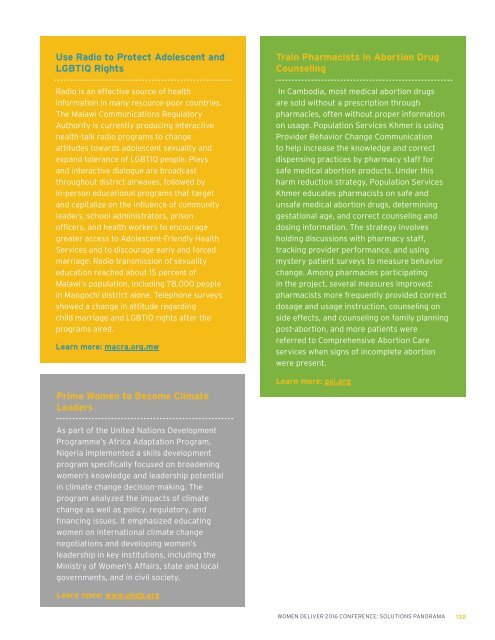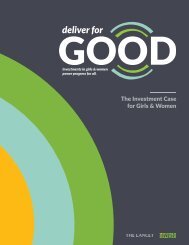Solutions Panorama
A collection of 100 programs, initiatives, and strategies that were shared at the Women Deliver 2016 Conference.
A collection of 100 programs, initiatives, and strategies that were shared at the Women Deliver 2016 Conference.
Create successful ePaper yourself
Turn your PDF publications into a flip-book with our unique Google optimized e-Paper software.
Use Radio to Protect Adolescent and<br />
LGBTIQ Rights<br />
Radio is an effective source of health<br />
information in many resource-poor countries.<br />
The Malawi Communications Regulatory<br />
Authority is currently producing interactive<br />
health-talk radio programs to change<br />
attitudes towards adolescent sexuality and<br />
expand tolerance of LGBTIQ people. Plays<br />
and interactive dialogue are broadcast<br />
throughout district airwaves, followed by<br />
in-person educational programs that target<br />
and capitalize on the influence of community<br />
leaders, school administrators, prison<br />
officers, and health workers to encourage<br />
greater access to Adolescent-Friendly Health<br />
Services and to discourage early and forced<br />
marriage. Radio transmission of sexuality<br />
education reached about 15 percent of<br />
Malawi’s population, including 78,000 people<br />
in Mangochi district alone. Telephone surveys<br />
showed a change in attitude regarding<br />
child marriage and LGBTIQ rights after the<br />
programs aired.<br />
Learn more: macra.org.mw<br />
Prime Women to Become Climate<br />
Leaders<br />
Train Pharmacists in Abortion Drug<br />
Counseling<br />
In Cambodia, most medical abortion drugs<br />
are sold without a prescription through<br />
pharmacies, often without proper information<br />
on usage. Population Services Khmer is using<br />
Provider Behavior Change Communication<br />
to help increase the knowledge and correct<br />
dispensing practices by pharmacy staff for<br />
safe medical abortion products. Under this<br />
harm reduction strategy, Population Services<br />
Khmer educates pharmacists on safe and<br />
unsafe medical abortion drugs, determining<br />
gestational age, and correct counseling and<br />
dosing information. The strategy involves<br />
holding discussions with pharmacy staff,<br />
tracking provider performance, and using<br />
mystery patient surveys to measure behavior<br />
change. Among pharmacies participating<br />
in the project, several measures improved:<br />
pharmacists more frequently provided correct<br />
dosage and usage instruction, counseling on<br />
side effects, and counseling on family planning<br />
post-abortion, and more patients were<br />
referred to Comprehensive Abortion Care<br />
services when signs of incomplete abortion<br />
were present.<br />
Learn more: psi.org<br />
As part of the United Nations Development<br />
Programme’s Africa Adaptation Program,<br />
Nigeria implemented a skills development<br />
program specifically focused on broadening<br />
women’s knowledge and leadership potential<br />
in climate change decision-making. The<br />
program analyzed the impacts of climate<br />
change as well as policy, regulatory, and<br />
financing issues. It emphasized educating<br />
women on international climate change<br />
negotiations and developing women’s<br />
leadership in key institutions, including the<br />
Ministry of Women’s A ffairs, state and local<br />
governments, and in civil society.<br />
Learn more: www.undp.org<br />
WOMEN DELIVER 2016 CONFERENCE: SOLUTIONS PANORAMA 132



